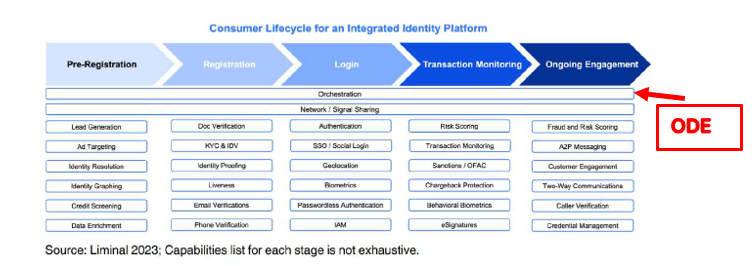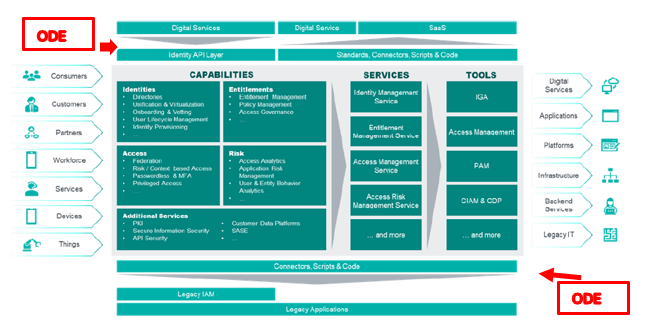AI-Assisted Identity Orchestration
There’s a lot of hype about using AI, but there are some useful applications. One of these applications is using AI to facilitate identity verification using dynamic orchestration.
Identity orchestration is increasingly recognized as the backbone that underpins identity ecosystems. Analysts in the identity community present these ecosystems as architectures, such as Liminal’s “Identity Authorization Network (IAN)” and KuppingerCole’s “Identity Fabric.”
Orchestration runs through each of these architectures to facilitate and orchestrate extensive identity ecosystems, comprising all of the components to ensure identity security. Avoco provides an Identity Orchestration and Decisioning (ODE) that underpins the identity ecosystem.
Liminal IAN

KuppingerCole Identity Fabric

The validation of identity orchestration by such experienced and knowledgeable analysts is welcomed. However, to optimize identity-enabled transactions, identity orchestration must play a dynamic role in the ecosystem.
The part played by identity orchestration in identity verification
Orchestration plays several roles in an identity ecosystem. The orchestration service connects identity APIs and allows ecosystem components to communicate. This may involve protocol translation and/or handling non-standard protocols. A core task of an identity orchestration service is to call upon verification services during a user journey. Users may be human or non-human; devices, employees, consultants, freelancers, vendors, customers, and so on. The verification can be a one-off check or comprise multi-factor verification. The verification may include other checks alongside identity, such as biometric liveliness, AML, and anti-fraud checks. The mix-and-match nature of verification orchestration is a critical development in the identity ecosystem because it can help to identify and prevent deepfake identity.
Notably, identity orchestration that utilizes decisioning can make decisions based on incoming data. These decisions help to optimize user journeys and enhance identity security.
A new development in the world of identity orchestration is the application of AI.
How can AI optimize identity verification?
AI, including machine learning and Generative AI, can enhance an identity orchestration service. Avoco is unique in providing identity orchestration with decisioning. The decisioning is dynamic. That is, incoming data is used to change a system’s behavior. For example, if a possible deepfake ID is detected during a registration, the orchestration service will adjust its behavior to either stop the registration or require additional checks.
AI can automate and optimize the decisioning part of the verification process.
ODE’s dynamic rules engine drives verification decisions. Data entering the system is used to make decisions to optimize the verification journey. The system is itself dynamic. Rules determine how the system reacts to the incoming data, adjusting the requirements on the fly. The underlying rules are created to reflect the needs of the service. For example, if this is a retailer, there may be a rule that an age-restricted product cannot be bought until the customer proves their age is over X.
By using AI to generate rule dynamically, the system can become even more receptive to changes in an environment. Also, this is a no-code service, whereby designers, business analysts, and other non-coders can generate AI-assisted rules to ensure the identity ecosystem works as required. The AI-coding service that creates the rules is self-modifying, identifying any discrepancies or contraindications between rules and other ecosystem elements. Dynamic rules that are AI-assisted will also reflect the current cyber threat landscape, rules adjusting to new and emerging threats.
How AI benefits identity orchestration
- Learns to improve rules over time
- Optimizes how your ecosystem works
- Enhances identity security using relevant rules that reflect cybersecurity threats
- Ensures that the verification options are relevant to the use case
- Adjusts rules based on updates to regulations
- Allows non-coders to design and develop identity ecosystems that work with their business goals
- Reduces the bandwidth on IT teams
For further details on how to create optimized and secure identity verification contact Avoco

Optimize your identity journeys with Avoco